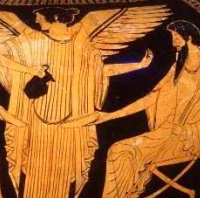- About Us
- Columns
- Letters
- Cartoons
- The Udder Limits
- Archives
- Ezy Reading Archive
- 2024 Cud Archives
- 2023 Cud Archives
- 2022 Cud Archives
- 2021 Cud Archives
- 2020 Cud Archives
- 2015-2019
- 2010-2014
- 2004-2009
 |
Poetry From The Cud: |
I.
Narcissus sits brooding,
his backside against the wall
of jagged rocks and boulders
that enclose
the pool of water
in which he previously
gazed, enamored
of his antique beauty,
the mirror of its surface glistening
placidly beneath
the blazoning rays of the Sun.

He pulls his knees up against
his naked, tanned chest and
embraces his ankles,
the fingers of each hand
entwined
one within the other,
his once golden
smile fading
into the forever-frozen
features of a Grecian Pieta,
as he buries his tear-
stained face
in the taut
smoothness of his athlete’s thighs.

II.
The tubercular Keats sits coughing
at his auburn-colored hardwood roll-top desk
in the twilight of a brisk day,
a candlewick glowing,
throwing shadows across the room
as the blood in his veins
courses through
his muse-fired brain
and morphs into the
indelible ink
with which he quickly,
feverishly pens
his timeless
“Ode on a Grecian Urn.”
The dusty, brown-paper covered volumes
of Ancient art
and Classical history
lay scattered on the desk
as he ponders
the meaning of life
as erected and told in the epoch-
making feats of man,
cast and polished into
monuments of ingenuity
that no storm of Nature
or of Man can crush or erase.

III.
Proust sits in his bed
in the famous cork-lined room
in the heart of modernizing Paris,
his back against the featherless pillows
as he uses his legs for a desk (what an innovative man!),
writing his world-famous
tome dedicated to Memory
and the intransient nature
of things, In Search of Lost Time,
while the lime tea and
madeleines
on the breakfast tray
grow cold and tasteless.

His little room becomes the stage
on which the remembrance
of things past
is enacted and opens wide
the window onto his semi-veiled
autobiography, four thousand pages
through which the multiple masks
of the never natural self
paint a Romantic’s living nightmare,
as Proust’s illness and mania
torture him into the enlightening terror that
the only true paradise is paradise lost,
or falsely remembered.
